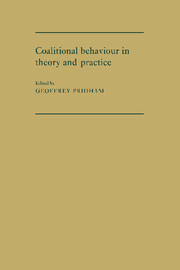Book contents
- Frontmatter
- Contents
- List of illustrations
- List of tables
- Notes on the contributors
- Preface
- 1 An inductive theoretical framework for coalitional behaviour: political parties in multi-dimensional perspective in Western Europe
- 2 Between theoretical elegance and political reality: deductive models and cabinet coalitions in Europe
- 3 Changing coalitional preferences among West German parties
- 4 The FDP and coalitional behaviour in the Federal Republic of Germany: multi-dimensional perspectives on the role of a pivotal party
- 5 Cabinet stability in the French Fourth Republic: the Ramadier coalition government of 1947
- 6 Coalition formation and maintenance in Belgium: a case-study of elite behaviour and changing cleavage structure, 1965–1981
- 7 The Dutch Christian Democratic party and coalitional behaviour in the Netherlands: a pivotal party in the face of depillarisation
- 8 Coalition or Fianna Fail? The politics of inter-party government in Ireland
- 9 Italy's party democracy and coalitional behaviour: a case-study in multi-dimensionality
- 10 Party coalitions in the first democratic period in Spain, 1977–1982
- 11 Coalitional theory and practice in Scandinavia
- 12 Multi-dimensional approaches to the study of local coalitions: some cross-national comparisons
- 13 Research notes
- Index
5 - Cabinet stability in the French Fourth Republic: the Ramadier coalition government of 1947
Published online by Cambridge University Press: 05 November 2011
- Frontmatter
- Contents
- List of illustrations
- List of tables
- Notes on the contributors
- Preface
- 1 An inductive theoretical framework for coalitional behaviour: political parties in multi-dimensional perspective in Western Europe
- 2 Between theoretical elegance and political reality: deductive models and cabinet coalitions in Europe
- 3 Changing coalitional preferences among West German parties
- 4 The FDP and coalitional behaviour in the Federal Republic of Germany: multi-dimensional perspectives on the role of a pivotal party
- 5 Cabinet stability in the French Fourth Republic: the Ramadier coalition government of 1947
- 6 Coalition formation and maintenance in Belgium: a case-study of elite behaviour and changing cleavage structure, 1965–1981
- 7 The Dutch Christian Democratic party and coalitional behaviour in the Netherlands: a pivotal party in the face of depillarisation
- 8 Coalition or Fianna Fail? The politics of inter-party government in Ireland
- 9 Italy's party democracy and coalitional behaviour: a case-study in multi-dimensionality
- 10 Party coalitions in the first democratic period in Spain, 1977–1982
- 11 Coalitional theory and practice in Scandinavia
- 12 Multi-dimensional approaches to the study of local coalitions: some cross-national comparisons
- 13 Research notes
- Index
Summary
In keeping with the overall aim of this volume to expand enquiry on the general subject of coalition behaviour, our intention in this is to explicate some of the conditions we expect to be associated with an acceptable theory of cabinet stability in parliamentary democracies, and, in an initial appraisal, discuss some implications of such factors in the setting of politics in the French Fourth Republic. In so doing, we seek to build on earlier work which has developed the outline of an ‘events’ approach to the problem (Browne, Frendreis and Gleiber 1984). The tradition of prior research has conceived cabinet stability as an attribute of cabinets which is operationalised in units of time and conditioned by configurations of other attributes characteristic of cabinets. Thus, cabinet stability is conceived as variable longevity (duration) dependent upon the variable values of salient cabinet attributes.
From a theoretical standpoint, identified attributes are expected to supply cabinets with a quality of ‘inherent stability’, which acts so as to protect or shield them from disturbances occurring in the environment. Regression analyses have given an indication of the ability of such attributes to condition duration, but the observed coefficients of determination have been so modest as to cast doubt on the ability of such models to achieve an acceptable empirical level of explanation.
An events perspective departs significantly from the standard attributes approach by identifying environmental events and conditions, arriving in the decision space of cabinet decision-makers, as the central theoretical element involved in an explanation of cabinet stability.
- Type
- Chapter
- Information
- Coalitional Behaviour in Theory and PracticeAn Inductive Model for Western Europe, pp. 93 - 116Publisher: Cambridge University PressPrint publication year: 1986



